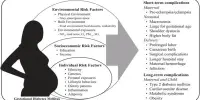If you follow the health news, you’ve probably heard of intermittent fasting. Intermittent fasting has been linked to a number of significant health benefits. Fasting, however, is not the same for men and women. If women try to fast but don’t do it correctly, it can do more harm than good.
Intermittent fasting has been shown to be an effective method of weight loss, but critics are concerned that it may have a negative impact on women’s reproductive hormones. Now, a team of researchers from the University of Illinois at Chicago has published a study in Obesity that adds to the body of evidence.
The researchers, led by UIC nutrition professor Krista Varady, followed a group of pre- and post-menopausal obese women for eight weeks on the “warrior diet” intermittent fasting method. The warrior diet calls for a four-hour feeding window per day during which dieters can eat without counting calories before returning to a water fast until the following day.
They compared the differences in hormone levels between groups of dieters who followed four- and six-hour feeding windows to a control group that followed no diet restrictions.
The study measured levels of estradiol, estrone, and progesterone – all hormones vital to pregnancy – as well, but only in post-menopausal women, due to the changing levels of these hormones throughout pre-menopausal women’s menstrual cycles.
Krista Varady
Varady and her colleagues discovered that after eight weeks, the levels of sex-binding globulin hormone, a protein that transports reproductive hormones throughout the body, remained unchanged in the dieters. The same was true for testosterone and androstenedione, a steroid hormone produced by the body to produce both testosterone and estrogen.
However, dehydroepiandrosterone or DHEA, a hormone that fertility clinics prescribe to improve ovarian function and egg quality, was significantly lower in both pre-menopausal and post-menopausal women at the end of the trial, dropping by about 14%.
While the drop in DHEA levels was the most significant finding of the study, in both pre and post-menopausal women, DHEA levels remained within the normal range by the end of the eight-week period.
Fig: The Impact of Intermittent Fasting on Female Hormones
“This suggests that in pre-menopausal women, the minor drop in DHEA levels has to be weighed against the proven fertility benefits of lower body mass,” Varady said. “The drop in DHEA levels in post-menopausal women could be concerning because menopause already causes a dramatic drop in estrogen, and DHEA is a primary component of estrogen. However, a survey of the participants reported no negative side effects associated with low estrogen post-menopause, such as sexual dysfunction or skin changes.”
As an added benefit, since high DHEA has been linked to breast cancer risk, Varady said a moderate drop in levels might be helpful in reducing that risk for both pre and post-menopausal women.
The study measured levels of estradiol, estrone, and progesterone – all hormones vital to pregnancy – as well, but only in post-menopausal women, due to the changing levels of these hormones throughout pre-menopausal women’s menstrual cycles. Among post-menopausal women, there was no change in these hormones at the end of eight weeks.
Women in both the four-hour and six-hour dieting groups experienced weight loss of 3% to 4% of their baseline weight throughout the course of the study, compared with the control group, which had almost no weight loss. The dieters also saw a drop in insulin resistance and in biomarkers of oxidative stress.
Perimenopausal women in their forties were excluded from the study. Nonetheless, Varady stated, “This, in my opinion, is an excellent first step. Thousands of pre- and post-menopausal women were observed using various alternate-day fasting and time-restricted eating strategies. All it does is cause people to eat less. You’re simply cutting calories by shortening your eating window. The majority of the negative information about intermittent fasting has come from studies on mice or rats. More research is needed to investigate the effects of intermittent fasting on humans.”
















